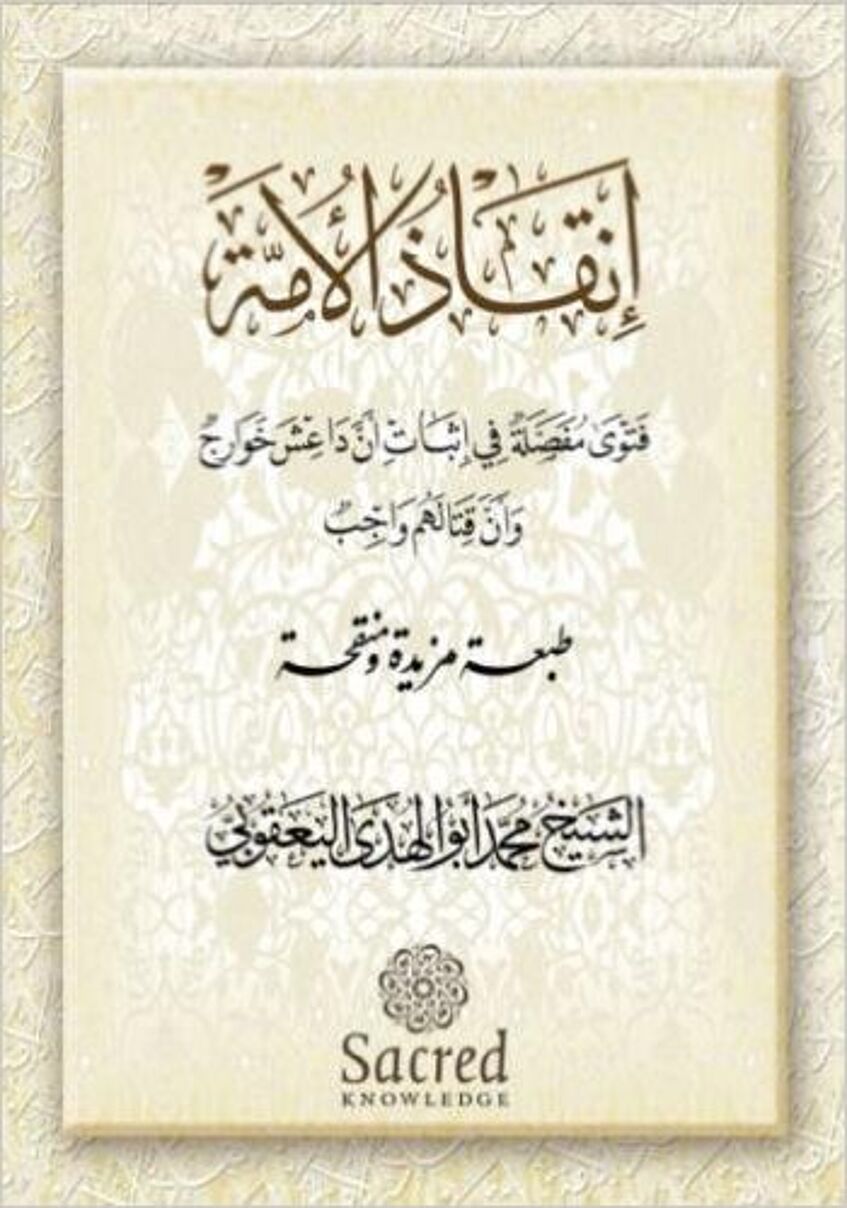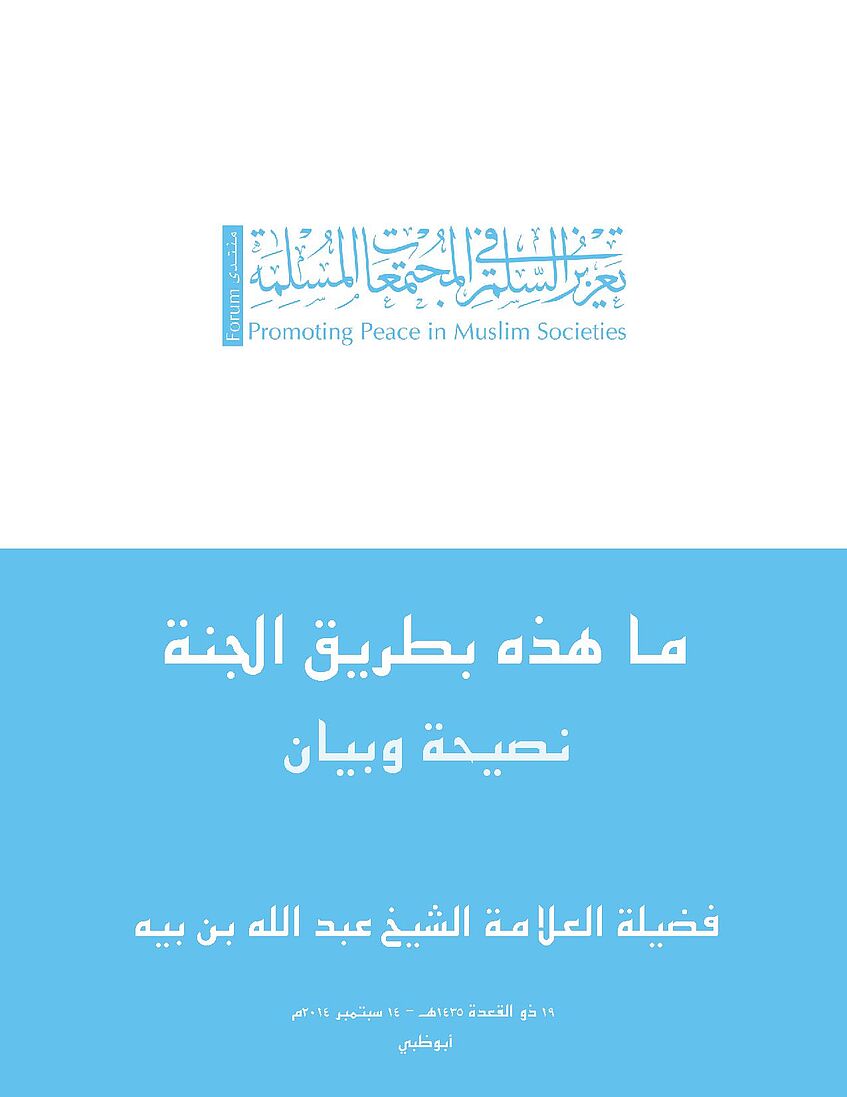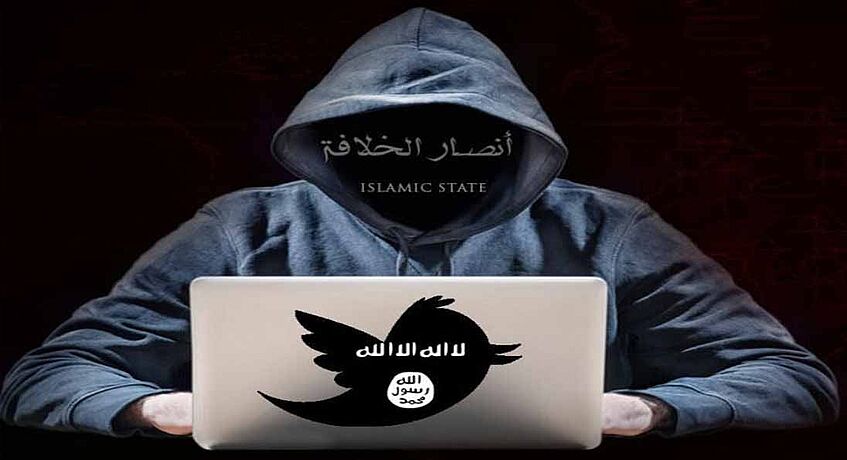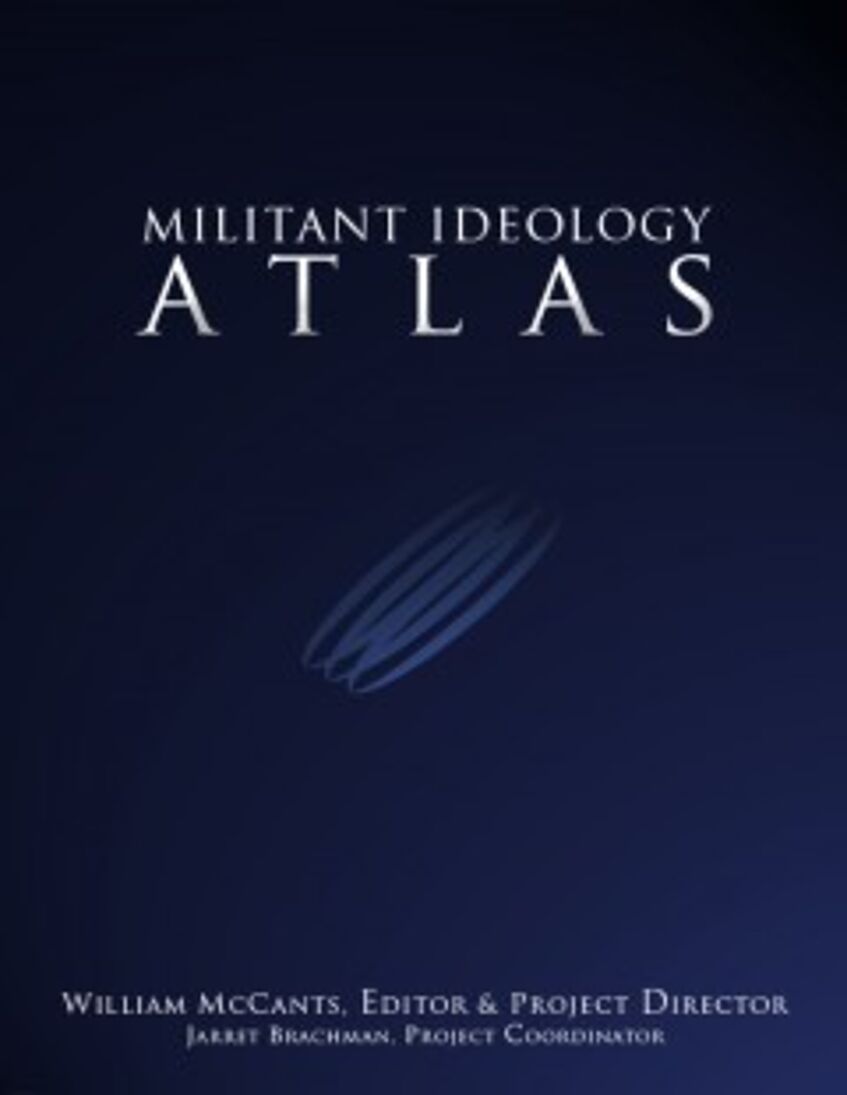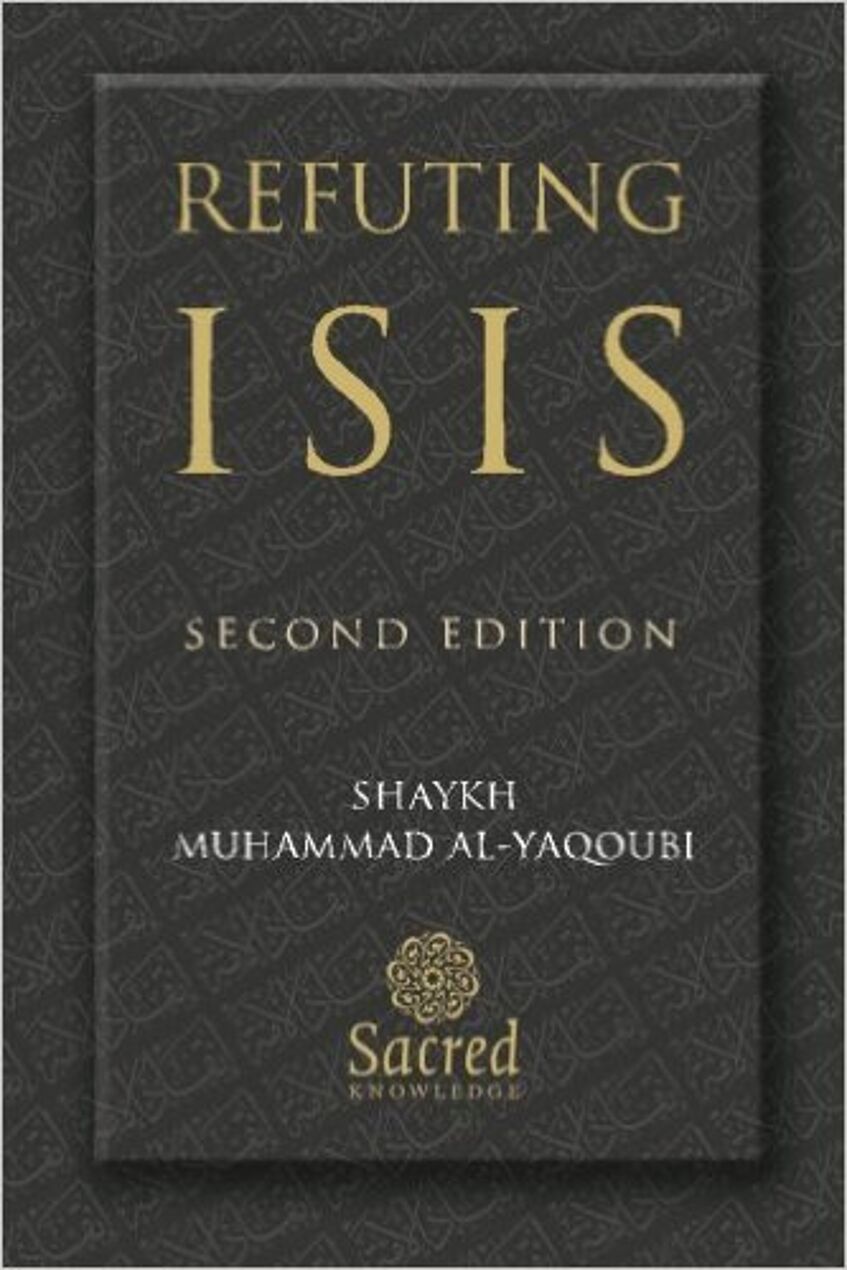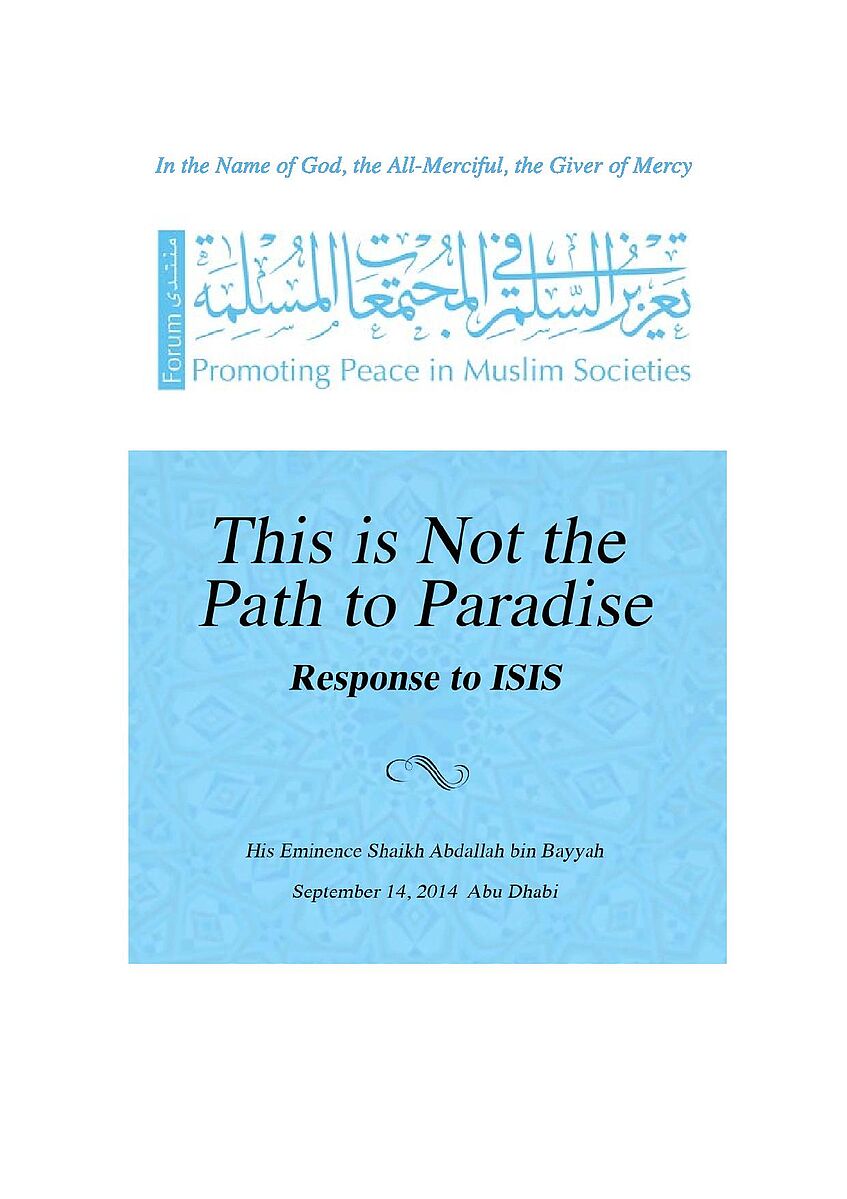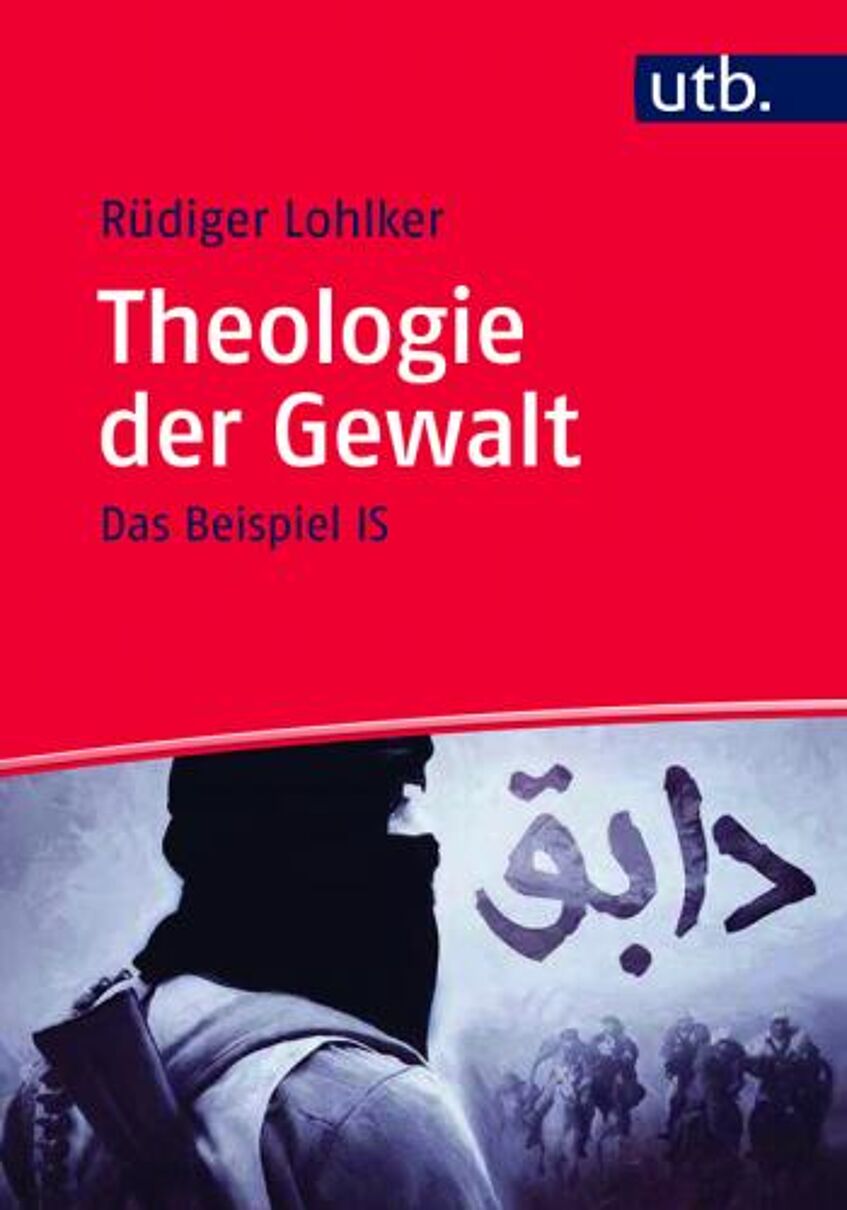Literature in Arabic
Refuting ISIS
Shaykh Muhammad Al-Yaqoubi - Refuting ISIS.
Sacred Knowledge, 2016 (2nd Ed.)
159 pages
ISBN: 978-1-9082-2418-7
From Amazon.com: "The Islamic State in Syria and Iraq (ISIS) constitutes the most serious threat Islam has ever faced. To justify its horrible crimes and appeal to Muslims around the world, ISIS has based its ideology on a superficial and literalist approach to the Sacred Texts of Islam - the Holy Qur'an and the Prophetic Tradition. ISIS manipulates religion to brainwash angry young Muslims, who have little knowledge of Islamic theology and jurisprudence.
Therefore, the Muslim scholars are obliged to respond with a counter-narrative that elucidates the reality of Islam and its commitment to tolerance. There exists a plethora of proofs that demonstrates ISIS' actions do not represent Sunni Islam and its claims are based on clear fallacies. The author, Shaykh Muhammad Al-Yaqoubi, a renowned scholar and one of the 500 most influential Muslims in the world today, presents in this invaluable book a thorough refutation of ISIS' beliefs and crimes. Providing authentic quotes that destroy the allegations of ISIS, Shaykh Al-Yaqoubi reaches the conclusion that this group does not represent Islam, its declaration of a caliphate is invalid, and fighting it is an obligation upon Muslims."
Shaykh Abdullah Bin Bayyah's Fatwa against ISIS
Click HERE for a Fatwa Response (in Arabic) against ISIS by the renowned Sunni scholar Shaykh Abdullah Bin Bayyah. In this fatwa, the Shaykh tries to start a discussion about the true doctrines of Islam and sets out to refute several (legal) opinions by ISIS. This is especially noteworthy because he does not just say "ISIS is not Islam" but instead takes their religious and legal claims seriously and refutes them on the basis of the Qur'an and Islamic traditions.
Here is Shaykh Bin Bayyah's biography (in English) from his own website:
"Shaykh Abdullah Bin Bayyah was born in 1935 in the East of Mauritania. He is a scholar who grew up in a house known for its scholarship; his father Shaykh Mahfoudh Ben Bayah, may God have mercy on him, was one of the region’s eminent scholars and the head of the Conference of Mauritanian Scholars established after the country’s independence.
He studied in the Mauritanian centers of learning known as Mahadhir especially the school of his father Shaykh Mahfoudh Ben Bayah in which all the sacred sciences were taught including: jurisprudence, legal theory, syntax, language, rhetoric, Quranic exegesis and its auxiliary sciences, and the science of Prophetic tradition.
He was able to progress rapidly in these sciences and was successful in the exam set by the Judiciary after independence.
He was sent to study law at the Faculty of Law in Tunisia and was trained in the Tunisian courts in 1961. Twelve judges were chosen and each of them presented a research paper in Juristic method and law and Abdullah Bin Bayyah was first in his group."
Literature in English
Jihadist Networks
Fisher, Ali - Swarmcast: How Jihadist Networks Maintain a Persistent Online Presence. In: Perspectives on Terrorism, Vol 9, No 3 (2015).
Ali Fisher terms the media strategy of the self-designated "Islamic State" as a swarmcast, a network that constantly reconfigures itself while having an uninterrupted coherent output. The article outlines, describes and identifies big data and network analysis of Jihadist online behaviour. The author provides evidence based on big data and network analysis methods that Jihadist groups have developed a persistent presence online through which to distribute their content. The persistent presence is made possible by the Swarmcast; a constantly evolving dispersed network which reconfigures like a flock of birds in flight and which is based on the emergent behaviour of the Media Mujahidin. Analysis of a series of case studies demonstrates that the key factors in enabling the swarmcast are Speed, Agility and Resilience, which together ensure the Media Mujahidin can overcome current tactical approaches to disruption including content removal and account suspension. Furthermore, the author recommends strategic level approaches which focus on disrupting the network at a systemic level rather than inconveniencing individuals who already consider suspension both a badge of honour and the 'cost of doing business'.
In particular IS has fully exploited the opportunity created by the proliferation of social media platforms to create a persistent as well as ideologically cohesive presence for jihadist propaganda online which is intended to attract fighters and fundraisers to the cause.
The article examines the activity of the 'media mujahidin' - the supporters of jihadist groups who disseminate propaganda content online and who are not necessarily members of groups such as IS. These media operatives engage through a dispersed network of accounts that are in a state of constant reconfiguration much like the way a swarm of bees or flock of birds constantly reorganizes in mid-flight. Drawing on the metaphor of a swarm this article introduces the net-war inspired concept of the user curated Swarmcast and demonstrates the role of the Swarmcast in maintaining the persistent presence of Jihadist content online.
The article concludes that future policy to counter the dissemination of Jihadist content must challenge the Swarmcast on a strategic level. To be successful, strategies will need to take account of all three components of the Swarmcast when employing takedowns or other counter measures. This will mean focusing on strategic approaches to disrupting the system-wide emergent structures and collective behaviours rather than the tactical removal of individual accounts.
Militant Ideology Atlas
McCants, William (ed.) - Militant Ideology Atlas
November 1, 2006
In 2006 the Combating Terrorism Center (CTC) at West Point published a groundbreaking study on the key Arabic writings published by core jihadist and Islamist ideologues. The Militant Ideology Atlas is a in-depth study of the Jihadi Movement's top thinkers and their most popular writings. A pioneer work and the first systematic mapping of the ideology inspiring al-Qaeda at the time and nowadays the self-proclaimed "Islamic State". The CTC's researchers spent one year mining the most popular books and articles in al-Qaeda's online library, profiling hundreds of figures in the Jihadi Movement, and cataloging over 11,000 citations. The empirically supported findings of the project are surprising: The most influential Jihadi intellectuals are clerics from Jordan and Saudi Arabia, two of the US's closest allies in the Middle East. Among them, the Jordanian cleric Abu Muhammad al-Maqdisi has had the most impact on other Jihadi thinkers and has been the most consequential in shaping the worldview of the Jihadi Movement. The "Militant Ideology Atlas" is a practical handbook for researchers and practitioners who need to follow up, identify or grade texts, authors and key ideology specific items. The Atlas, free to download on the CTC website, offers a "Ranking of Texts", "Bibliography" and an important "Biographies" of the radical authors.
Refuting ISIS
Shaykh Muhammad Al-Yaqoubi - Refuting ISIS.
Sacred Knowledge, 2016 (2nd Ed.)
152 pages
ISBN: 978-1-9082-2419-4
From Amazon.com: "This second edition of the book comes after the heinous attacks that ISIS perpetrated in Egypt, Lebanon, Turkey, France, the USA and Indonesia. These attacks, which must be condemned by Muslim scholars and preachers around the world, are another testimony that, by killing women, children, and civilians, ISIS betrayed Islam, betrayed the Holy Quran, and betrayed the teachings of Prophet Muhammad (PBUH).
After the overwhelming response to the first edition, the author felt the need for a second edition that quenches the thirst of the readers with more details. He penned this second edition to further elaborate on many important topics, such as the prohibition of burning human beings, the abolition of slavery, and Islam's position towards minorities. New subjects are also tackled, such as the invalidity of excommunicating Muslim rulers for not applying certain aspects of Shari'ah, Islam's position towards democracy, and the prohibition of destroying pre-Islamic monuments and sacred sites. Several other topics benefitted from more rigorous proofs, especially the section confirming that ISIS criminals have left the fold of Islam and are no longer Muslims."
Shaykh Abdullah Bin Bayyah's Fatwa against ISIS
Click HERE for a Fatwa Response (in English) against ISIS by the renowned Sunni scholar Shaykh Abdullah Bin Bayyah. In this fatwa, the Shaykh tries to start a discussion about the true doctrines of Islam and sets out to refute several (legal) opinions by ISIS. This is especially noteworthy because he does not just say "ISIS is not Islam" but instead takes their religious and legal claims seriously and refutes them on the basis of the Qur'an and Islamic traditions.
Here is Skaykh Bin Bayyah's biography from his own website:
"Shaykh Abdullah Bin Bayyah was born in 1935 in the East of Mauritania. He is a scholar who grew up in a house known for its scholarship; his father Shaykh Mahfoudh Ben Bayah, may God have mercy on him, was one of the region’s eminent scholars and the head of the Conference of Mauritanian Scholars established after the country’s independence.
He studied in the Mauritanian centers of learning known as Mahadhir especially the school of his father Shaykh Mahfoudh Ben Bayah in which all the sacred sciences were taught including: jurisprudence, legal theory, syntax, language, rhetoric, Quranic exegesis and its auxiliary sciences, and the science of Prophetic tradition.
He was able to progress rapidly in these sciences and was successful in the exam set by the Judiciary after independence.
He was sent to study law at the Faculty of Law in Tunisia and was trained in the Tunisian courts in 1961. Twelve judges were chosen and each of them presented a research paper in Juristic method and law and Abdullah Bin Bayyah was first in his group."

The Illusion of an Islamic State
Wahid, Abdurrahman - The Illusion of an Islamic State.
LibForAll Foundation Press, 2011
XXXII, 549 pages
ISBN: 978-0-9834629-0-3
HERE at Amazon.com
"The Illusion of an Islamic State" is a book published in 2009 and was called a "remarkable (...) a roaring success" by the Washington Post. The book was edited by former Indonesian president Abdurrahman Wahid and the most influential Islamic scholars of the Nahdlatul Ulama, the world's largest Sunni Muslim organization with over 50 million members and the Muhammadiyya (30 million). Wahid foresaw the need to engage with extremist arguments, on a theological and social basis, to ensure within the context of Indonesia a societal resilience build on a tradition of pluralism, tolerance and inclusion remains the upper hand. The premises of the book is summoned up by C. Holland Taylor, co-editor and co-founder of the world's first Muslim NGO LibForAll that was established in the aftermath of the 9/11 attacks to promote tolerance and pluralism, stating that the majority of Muslims oppose violent extremism in the name of Islam. "When mobilized, this silent majority has the ability to isolate extremists. Mainstream Muslims can exert social pressure in millions of unique interactions, that peel away less committed rank and file extremists, isolating Islamist leaders and leaving them with a small and shrinking band of hard core followers."
The book "The Illusion of an Islamic State" is more than ever needed today and yet this unique and extensive study by the Nahdlatul Ulama and Muhammadiyya on extremism in Indonesia and the ideology of Sunni extremists remains largely unknown outside of the world's largest Muslim country.
The book is a study on extremist actors in Indonesia and who, for example Muslim Brotherhood related political parties, seek to take over mosques and propagate their version of Islam. As Kyai Haji Hodri Ariev puts it "This conflict between radical and moderate views of Islam is increasingly visible" and the NU as much as the Muhammadiyya theological leadership have taken the task up to engage and refute extremist theology and religious teachings in general. This is a powerful book that acknowledges the opinions of religious extremists, takes these serious, and engages wholeheartedly to contextualize these arguments within the rich, 1.400 year long tradition of Islam. The reader is offered a better alternative to extremist and redundant readings of Qur'an and Sunna, more so powerful as religious authoritative and theologically well-rooted scholars issue these arguments.
As Syafii Maarif, the former chariman of the Muhammadiyya organization phrases "the goal is to raise our awareness, and counter the spread of extremist ideology in a peaceful and responsible manner (...) to facilitate a positive, constructive dialogue, both among Muslims and those of other faiths." The "Illusion" offers an in depth analysis of "Transnational Islamist Movement and their Accomplices in Indonesia" and thoroughly outlines the relationship of Sunni extremist movements to the Saudi Wahhabi line. "The Origins and Global Spread of Wahhabi/Muslim Brotherhood Ideology" is contextualized with the respective actions and operations of such movements in Indonesia. The authors, altogether renowned Muslim clerics and fluent in Arabic are aware of "the Infiltration of Indonesian Islam by Extremist Agents" and provide - based on their respective traditions - theological and social reactions on how to remain the resilience of Indonesian Islam, preventing the spread of extremist ideology and refuting the "theology of violence" offered by militant Sunni groups.
"The Illusion of an Islamic State" should be standard literature in the field of counter terrorism, social- and youth work tasked with preventing terrorism and when it comes to understanding Sunni extremism.
Literature in German
Theologie der Gewalt
Lohlker, Rüdiger - Theologie der Gewalt. Das Beispiel IS
UTB; Facultas, 2016
206 pages
ISBN: 978-3-8252-4648-8
HERE at the publisher's website and HERE at Amazon.de
HERE is a review of Prof. Lohlker's book.
The book was released in 2016 in German and an English version of “Theology of Violence according to the Islamic State” is planned to be released.
The fact that Sunni extremists, termed as “jihadists”, have produced significant amounts of resources that deal with religious issues, according to Lohlker, it becomes clear to everybody who can read and understand the mainly Arabic language propaganda materials of what jihadists are writing and saying that religion matters. In his book “Theology of Violence”, Rüdiger Lohlker, professor for Islamic Studies at the University of Vienna, deciphers and meticulously analyses various IS material for the non-Arabic speaking reader. IS seeks to codify the identity what it means to be a ‘true’ Sunni Muslim, having established curricula for religious teachings inside IS that consist of, for example, shari’a law teachings, scientific facts, Quran and Quranic reading (tafsir), terminology of the hadith and doctrinal theology (‘aqida), Islamic jurisprudence (usul al-fiqh), shari’a legitimacy of governance, history, Arabic literature and grammar, geography and physical education. This is a fundamental part of the strategy to consolidate the power of IS within the territory it controls, to streamline religious identity and loyalty according to Sunni extremist standards. Lohlker refers to this as “textual archaeology” that shows the importance of theology for IS. It incorporates existing discourses and arguments crafted by al-Qa’ida and other Sunni extremist groups and justifies IS military actions and daily behavior codes.
A major role of IS propaganda output to influence individuals worldwide is conveyed by the unprecedented quantity of videos. These videos are published through a technical resilient and highly professional dissemination structure on the Internet. The videos showcase ideology in action and is thus made easy to access and comprehend. Lohlker analysis several visual codes, habits and rituals that often occur within these films. For example the raised right index finger sends a signal of unity and coherence, confessing that there is only one God, the very fundamental notion of Sunni extremist ideology. IS has mastered the use of videos as the powerful message it sends is that the “Islamic State” is real, it is a “state” and it embodies the only permissible form of “Islam”. Being in control of territory further allows IS to apply ideology and document the enforcement of ideology on the communities it controls. These videos hence project influence on a coherent basis and further justifies the military expansion as well as the merciless persecution and killing of those that reject IS ideology or members of minority groups. To explain and sanction actions seen in the videos, IS created a group called “Maktabat al-himma”, whose mission is to explain the theological depth of these videotaped actions. These flyers are disseminated online and often seen as being handed out as flyers inside the IS territory. Such flyers using little text explain, for example, why shops are closed during the Friday prayers or why the “pledge of allegiance” to al-Baghdadi is obligatory for any ‘proper’ Sunni Muslim.
Lohlker’s book is an invaluable resource on many levels. First of all, he has meticulously collected Arabic language Sunni extremist material online and contextualizes this throughout the book in IS’ mindset and ideology. Religious scripture used by IS is contextualized by Lohlker to demonstrate the effect of jihadist strategy to establish their line of thinking as the only permissible Sunni Muslim identity while neglecting the vast corpus of Islamic writers, thinkers and philosophers throughout history. The explanation of key jihadist ideological terms and notions are comprehensibly explained, educating the readers not only about the depth of Arabic materials but also how easy to comprehend non-Arabic IS propaganda can be perceived by potential recruits who do not speak Arabic and cannot differentiate what IS offers as ‘religious identity’.

